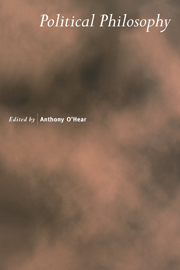Book contents
- Frontmatter
- Contents
- Preface
- Notes on Contributors
- Making the World Safe for Utilitarianism
- Innocent Before God: Politics, Morality and the Case of Billy Budd
- Democracy and Openness
- Rights and Human Rights
- Prerogative to Depart from Equality
- Casting the First Stone: Who Can, and Who Can't, Condemn the Terrorists?
- Against Egalitarianism
- Big Decision: Opting, Converting, Drifing
- The Epistemology of Unjust War
- High Culture, Low Politics
- Edmund Burke and the Anglo-American Tradition of Liberty
- The Politics of Emotion: Liberalism and Cognitivism
- Index of Names
Innocent Before God: Politics, Morality and the Case of Billy Budd
Published online by Cambridge University Press: 04 August 2010
- Frontmatter
- Contents
- Preface
- Notes on Contributors
- Making the World Safe for Utilitarianism
- Innocent Before God: Politics, Morality and the Case of Billy Budd
- Democracy and Openness
- Rights and Human Rights
- Prerogative to Depart from Equality
- Casting the First Stone: Who Can, and Who Can't, Condemn the Terrorists?
- Against Egalitarianism
- Big Decision: Opting, Converting, Drifing
- The Epistemology of Unjust War
- High Culture, Low Politics
- Edmund Burke and the Anglo-American Tradition of Liberty
- The Politics of Emotion: Liberalism and Cognitivism
- Index of Names
Summary
I begin with the story told by Herman Melville in his short novel, Billy Budd. The year is 1797. Britain is engaged in a long and bitter war against France, and the British war effort has been threatened by two naval mutinies: the Nore Mutiny and the mutiny at Spithead. The scene is His Majesty's Ship, the Indomitable, and the central character is Billy Budd, sailor. Billy Budd is a young man of exceptional beauty, both physical and moral, whose only flaw is a stammer. He is loved by all his fellow sailors except the master-at-arms, John Claggart. The incarnation of evil, Claggart recognises in Billy the incarnation of goodness, and is consumed by a jealousy which leads him to accuse Billy (falsely) of inciting the crew to mutiny. Alone with Claggart and the ship's Captain, Edward Vere, Billy hears the lying charge against him. He is enraged, but his stammer prevents him from responding in words. He strikes Claggart, and the blow is fatal. Billy Budd, sailor, has killed the master-at-arms of one of His Majesty's ships on active service, and the penalty for this is death.
It now falls to Captain Vere to judge Billy Budd's case. He knows Billy to be innocent of incitement to mutiny, but he also knows that Billy has committed a capital offence. How is he to proceed? Melville writes:
In the jugglery of circumstances preceding and attending the event on board the Indomitable, and in the light of that martial code whereby it was formally to be judged, innocence and guilt … effectively changed places. […]
- Type
- Chapter
- Information
- Political Philosophy , pp. 23 - 38Publisher: Cambridge University PressPrint publication year: 2007



